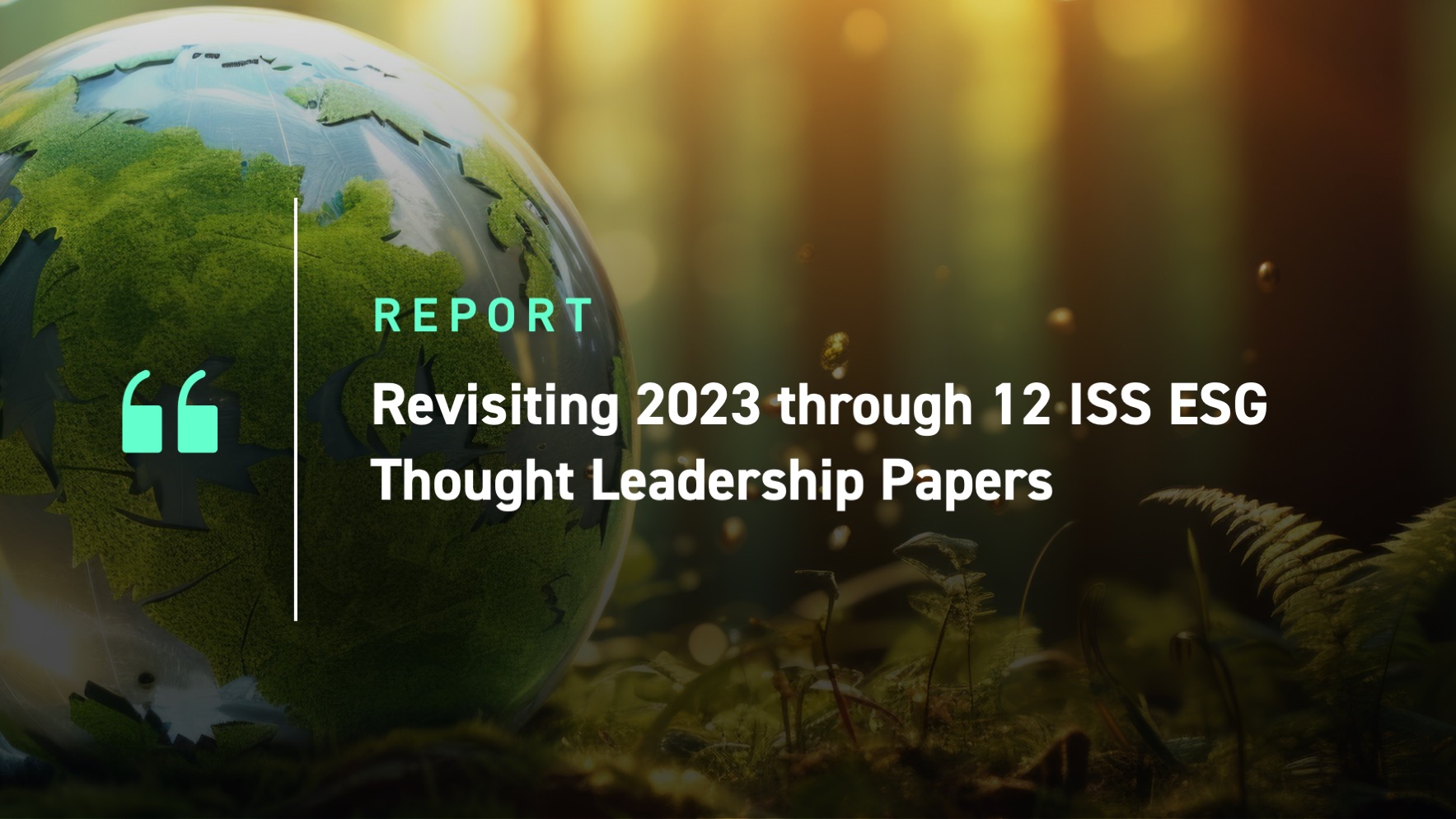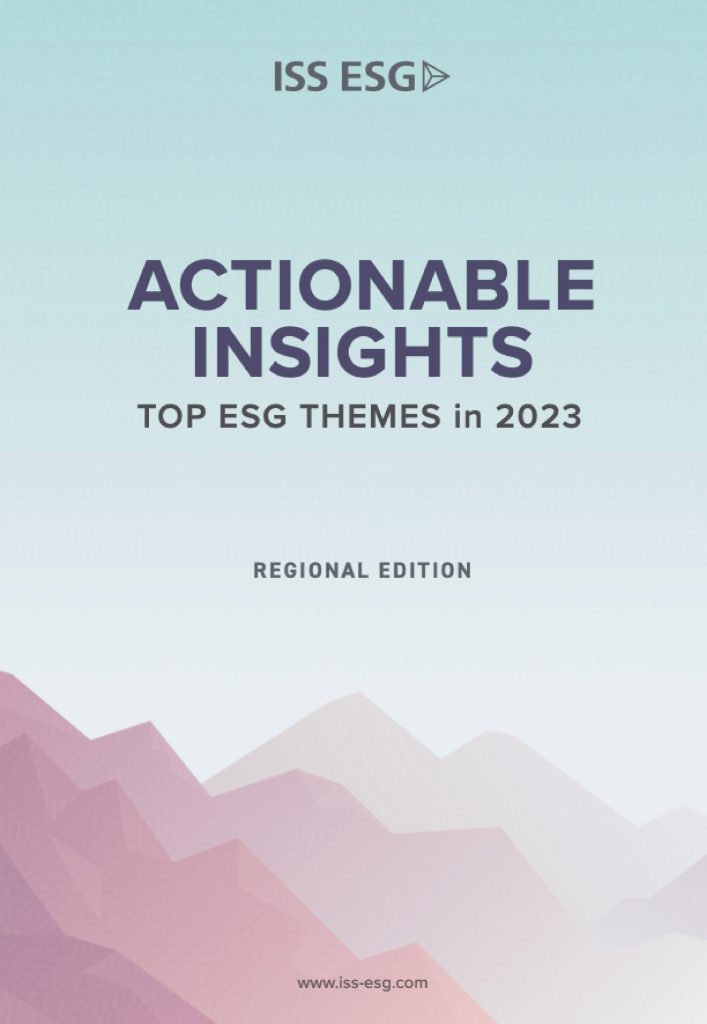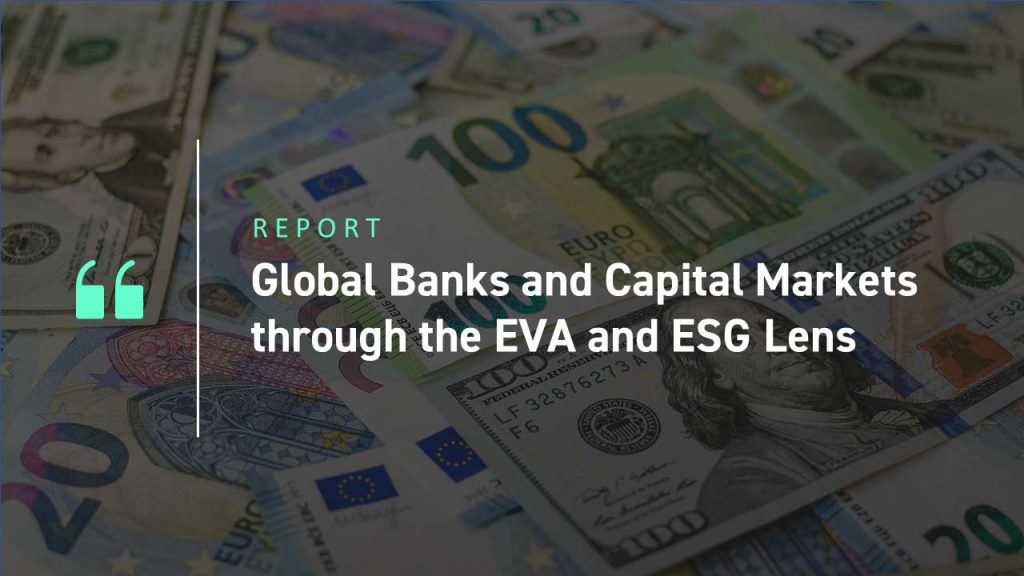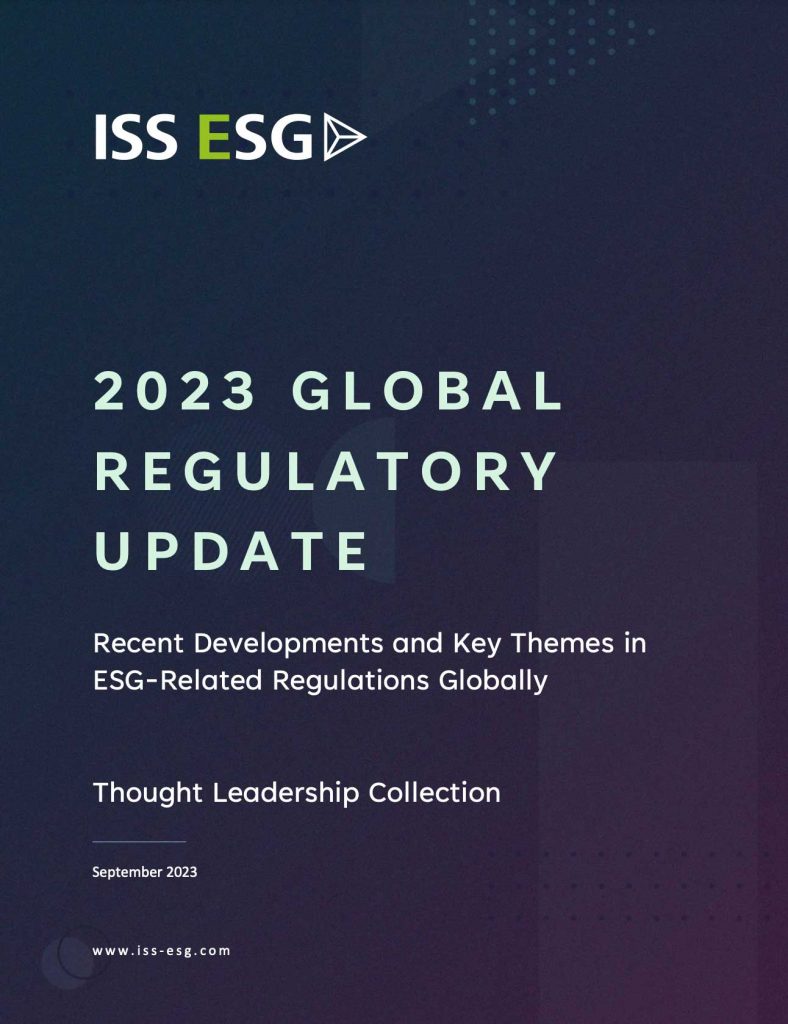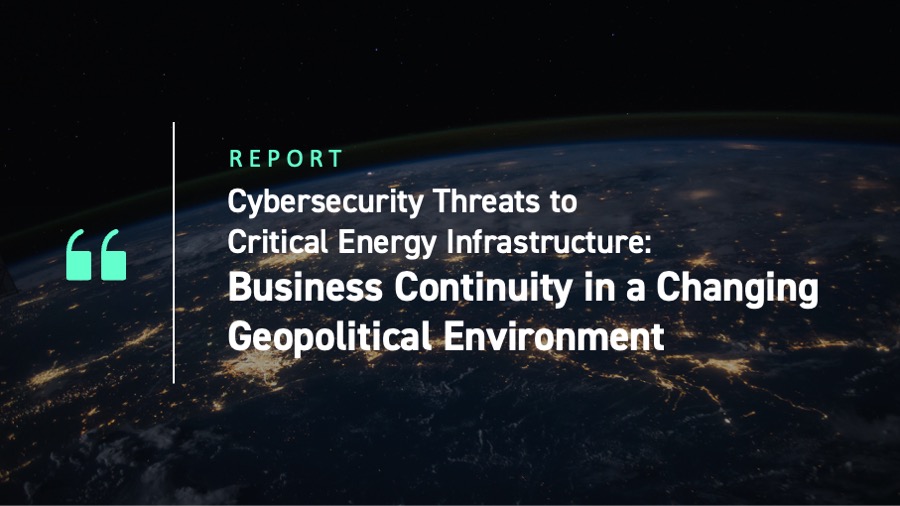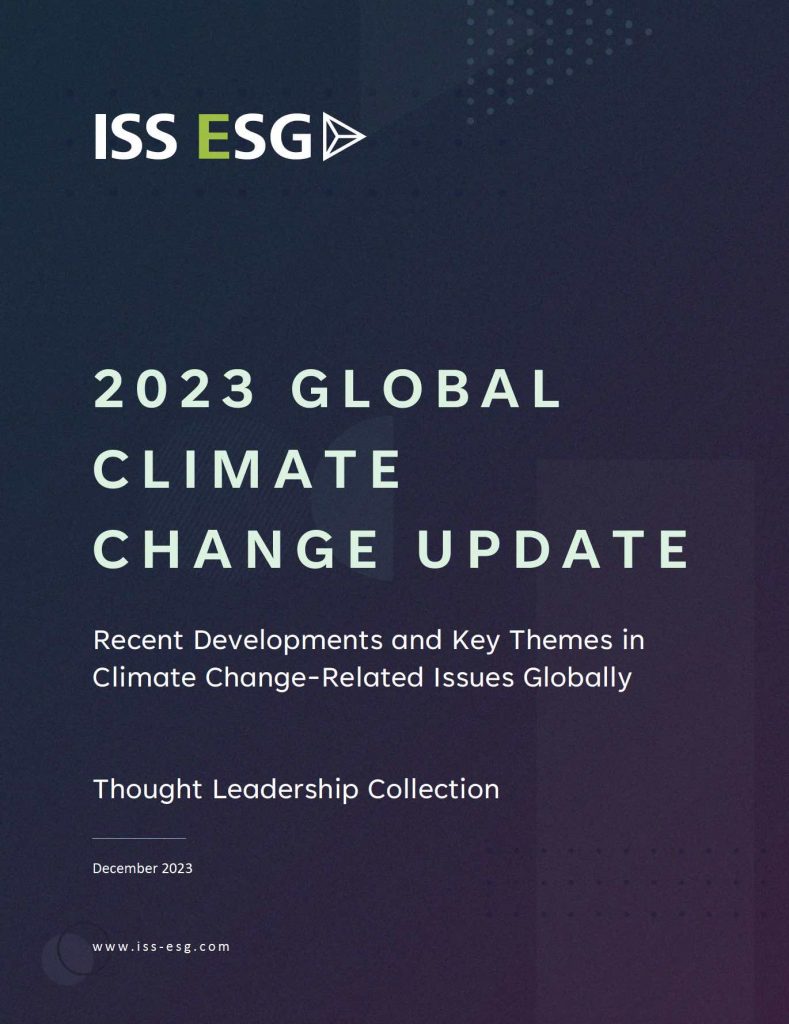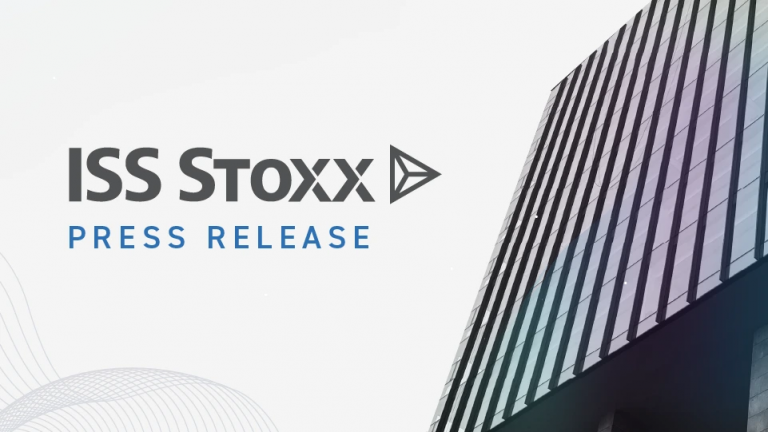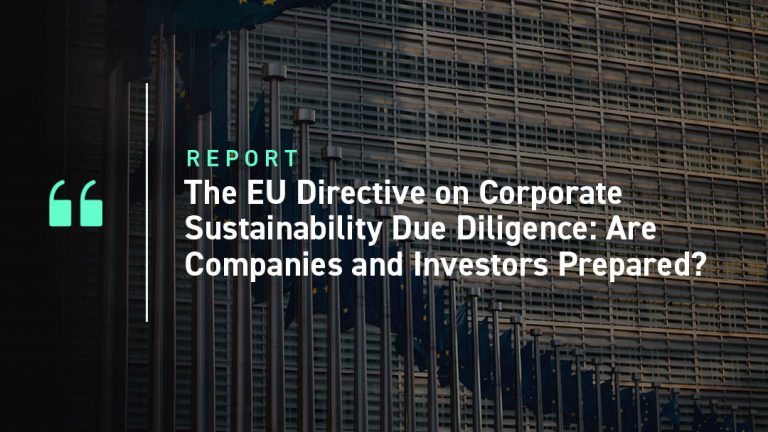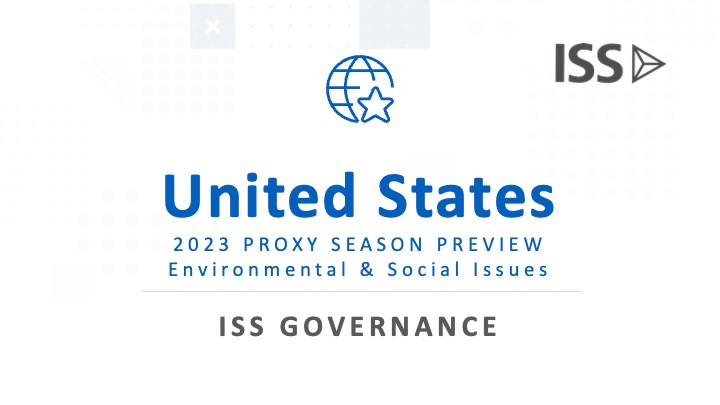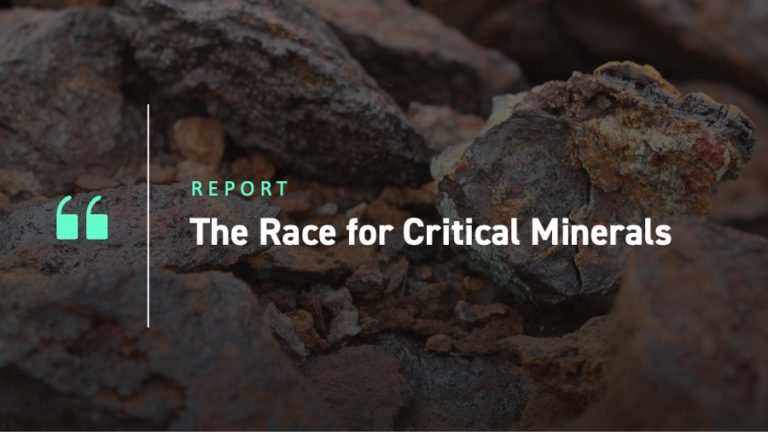ISS ESG Thought Leadership publications in 2023 covered a variety of ESG-related topics with significant relevance for investors. The selected publications highlighted below, which range from ISS Insights blog posts to multi-chapter reports, illustrate the breadth of Thought Leadership’s coverage of current topics relevant to ESG investing.
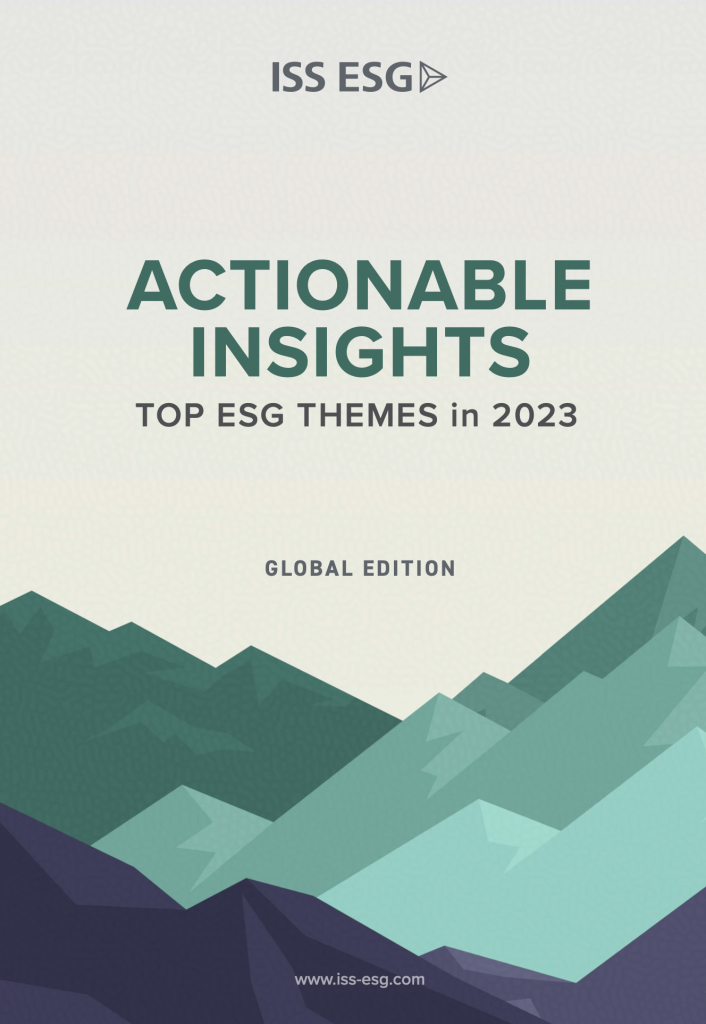
1. Actionable Insights: Top ESG Themes in 2023 – Global Edition
January 26, 2023
The Actionable Insights report series provides a year-long resource, and roadmap, for global investors seeking to navigate the complexity of diverse global and regional ESG issues and their impact across various investment markets. The 2023 edition examined factors such as volatile markets, evolving regulation, the COVID-19 pandemic, and the war in Ukraine that expose investment professionals to a wide range of ESG risks and opportunities on issues ranging from employee health and safety to supply-chain management to economic sanctions.
The COVID-19 pandemic has highlighted the vulnerabilities of societies and economies to infectious diseases and has given new importance to planning and preparedness for future pandemics. Policymakers, business leaders, and investors can stay aware of potential future health crises through analysis of emerging trends. One such trend is antimicrobial resistance (AMR). AMR was already an emerging public health threat before COVID, and the U.S. Centers for Disease Control and Prevention (CDC) have identified the COVID-19 pandemic as an incubator for AMR. Even high-income countries are facing the burden of alarming AMR levels, despite the availability of more expensive second-line antibiotics. While healthcare companies can play a key role in tackling this crisis, they are also facing major vulnerabilities of their own.
An in-depth, regionally focused complement to the Actionable Insights Global Edition, this report draws on comprehensive ISS ESG data, with research and insights from ISS ESG’s financial research and sector leads, climate specialists, and regulatory experts to help investors identify key regional ESG risks and opportunities likely to impact their portfolios in 2023. Concerns that cut across regions are climate change, accurate disclosure of ESG-related assets and activities, and the consequences of Russia’s invasion of Ukraine. More region-specific issues include the United States’ pursuit of climate mitigation measures through the Inflation Reduction Act, Brazil’s efforts to protect the Amazon from deforestation, and initiatives by Japan, South Korea, and Singapore to diversify and prioritize their energy transition strategies.
The collapse of Signature Bank of New York (SBNY) and Silicon Valley Bank (SVB), followed by the fallout of Credit Suisse Group (CSGN SW), put the spotlight on Financial Materiality and highlighted the importance of a comprehensive assessment through the ESG lens. EVA analysis shows that, unlike the failures at Signature Bank and Silicon Valley Bank, the collapse at Credit Suisse came after 10 years of poor management. The stress within the industry and the recent, surprising regularity of banks failing have resulted from a combination of rapid interest rate hikes in Europe and the U.S. and the market taking an aggressive mentality when it comes to weak banks. Depositors currently seem relatively safe, as central banks and regulators have stepped in to support these stakeholders and avoid further catastrophe. The same cannot be said for shareholders and bond holders, however.

5. Not a Thing of the Past: Child Labor in the US
March 23, 2023
U.S. officials have reported that child labor cases, far from being a problem of the past, have increased significantly in the United States over the past five years. A recent investigation by the New York Times found children working exhausting and often highly dangerous jobs across the United States in violation of child labor laws.
Most underage workers are migrant children from Central America who have arrived in the United States without their parents. Companies in the Automobile, Food Products, and Retail industries seem to be especially exposed to child labor risks. ISS ESG’s Norm-Based Research assesses companies’ adherence to international norms on human rights, labor standards, environmental protection, and anti-corruption. Norm-Based Research data on cases of child labor across geographies illustrate that the U.S. is the only OECD country, besides Turkey, with active child labor cases. The United States currently accounts for 4.0% of all assessed child labor cases globally, while Turkey accounts for 2.4%.
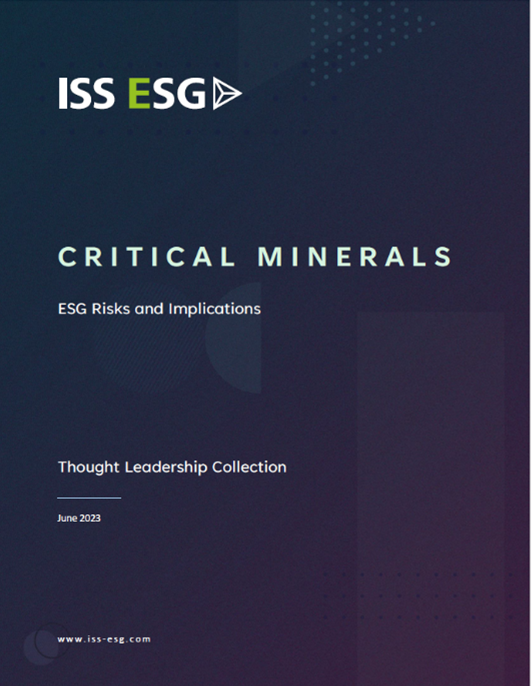
6. Critical Minerals: ESG Risks and Implications
June 30, 2023
Climate change and the energy transition imperative have significantly changed market dynamics for numerous commodities, and these changes have important ESG consequences. As the world retires fossil fuels, greater quantities of metal will be needed to electrify large swaths of the economy. This report explores the ESG risks and opportunities associated with these new supply/demand dynamics. Increased demand and rising prices have brought to the forefront sustainability weak points in raw material supply chains as well as environmental issues of increased metals extraction. Each metal has its own set of concerns, with certain commonalities. Cobalt, nickel, and copper supply all rely heavily on specific countries or regions for future growth. However, concerns of labor abuse (e.g., child labor), are more pertinent for cobalt mining. Meanwhile, lithium mining presents potential water supply concerns as well as significant reliance on a specific region, Latin America. Awareness of the issues and investment options are the start of the solution.
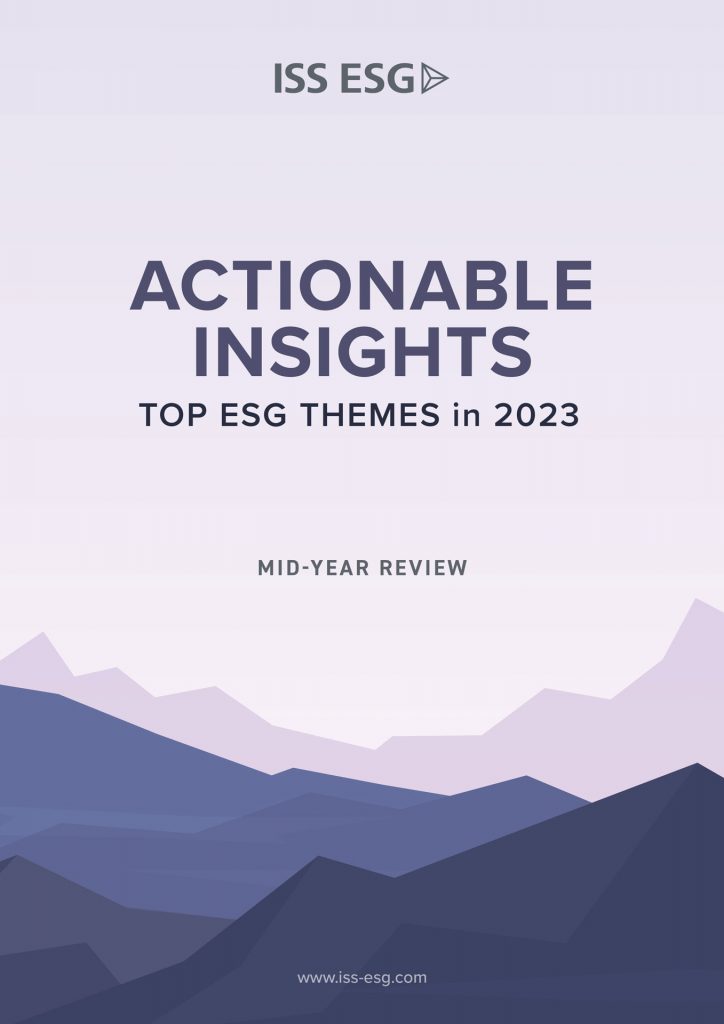
7. Actionable Insights: Top ESG Themes in 2023 – Mid-Year Review
July 19, 2023
A complement to the Actionable Insights global edition, the Mid-Year Review draws on comprehensive ISS ESG data, with research and insights from ISS ESG’s financial research and sector leads, climate specialists, and regulatory experts to help investors assess the extent to which key ESG risks and investment opportunities, identified in January as likely to impact their portfolios in 2023, had been actionable by the year’s mid-point. Following the form of a “catalogue of mid-year reviews,” each of the chapters in the original report is reviewed in the new report according to an identical structure. This approach examines notable developments in the first half of 2023 and then details expected implications for investors in the second half of 2023.

8. AI and Privacy: Toward a Social Cost of Data?
August 29, 2023
Digitalization and advances in artificial intelligence (AI) have come with a loss of privacy. The collective cost of what we share, from the time we wake up and check our phones until our watch finishes tracking our sleep the following evening, exposes a market failure that privacy regulation alone cannot fix. Businesses can look to digital service taxes (DSTs) and liabilities for recent data breaches to discern the potential ‘social cost of data’ related to their activities. For investors, the ISS ESG Corporate Rating provides support in determining how well businesses are addressing privacy issues.
This report reviews an array of notable developments in international and national regulation that addresses ESG issues. Policymakers across the globe have introduced, or are contemplating, extensive new regulatory requirements that aim to define terms such as ‘ESG’ or ‘sustainable investment’; enhance transparency on the part of investment managers and financial institutions as to the ESG risks and opportunities to which they may be exposed; and ensure corporate issuers furnish additional information for investors to assess material ESG risks and opportunities. In the 2023 Global Regulatory Update, ISS ESG takes a closer look at the evolution of the global sustainable investment regulatory landscape to date, analyzing the different regulatory initiatives across key themes and identifying some of the practical and implementation challenges.
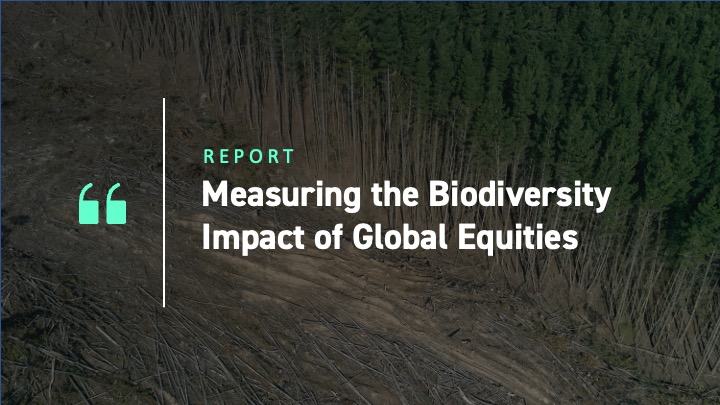
10. Measuring the Biodiversity Impact of Global Equities
August 15, 2023
The impact on biodiversity of global equities can be measured through the Potentially Disappeared Fraction of Species (PDF) and the Mean Species Abundance (MSA) metrics from the ISS ESG Biodiversity Impact Assessment Tool (BIAT). Within a global universe of large and mid-capitalization companies, biodiversity loss is largely driven by land-use change. Broken down by sector, Consumer Staples, Materials, and Industrials are most impactful in both Developed Markets (DM) and Emerging Markets (EM). The Packaged Foods and Meats sub-industry has the largest footprint. The top 100 most impactful companies globally contribute to about 60% of total PDF. The top 20% of companies in the universe contribute to 83% of total PDF. The ISS STOXX Biodiversity Index Series can help portfolios achieve substantial reductions in PDF, while also reducing carbon emissions and enhancing exposure to biodiversity-aligned Sustainable Development Goals.
Technological advancements and digitization have revolutionized critical sectors, including the energy infrastructures which sustain societies. Despite the increased efficiency offered by technical advances such as automation and digitalized operating systems, these advances also make the energy sector more vulnerable to cyberattack. Because of the high stakes involved and the frequency of cyberattacks in recent years, public and private institutions have been placing greater emphasis on cybersecurity. The International Energy Agency, European Commission, and U.S. Department of Energy have all given attention to the cybersecurity of the energy sector in particular. Some private companies have designated officers or teams responsible for cybersecurity within their organizations. Investors in the energy sector may also be concerned about cyberattack risks. The ISS ESG Cyber Risk Score can help investors seeking to minimize their exposure to such risks.
Policymakers and business and finance leaders across the globe are considering how to respond to climate change, while many institutional investors are examining the complex climate-related risks, challenges, and investment opportunities to which they may be exposed. This report analyzes climate-related issues such as evolving regulation and standards, corporate climate governance, investor engagement on climate issues, climate scenario analysis, and the impact of climate-related controversies. The report also identifies ISS ESG data and tools that can support investors in navigating these issues.
